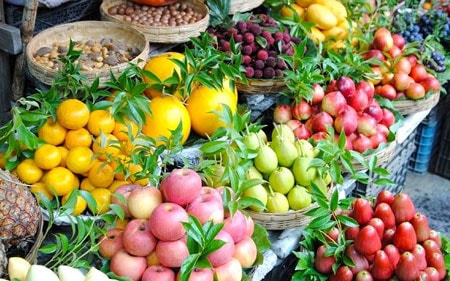30% of Chinese fruit samples contaminated with pesticides
This result is still limited because the current monitoring mechanism cannot control 100% of the fruits.
Recent test results from the Ho Chi Minh City Plant Protection Department show that up to 30% of Chinese fruit samples tested in the area were contaminated with pesticide residue, mainly tangerines, pears and apples.
A representative of the Plant Protection Department of Ho Chi Minh City said: "Among the imported fruits in Vietnam, only Chinese fruits are contaminated with pesticide residues at a rate of about 30%, while fruits from other countries have almost no pesticide residues. Every night, at each fruit wholesale market, the input is checked, with a quantity of 5 to 10 fruit samples for testing." According to the leader of the Plant Protection Department of Ho Chi Minh City, this result is still limited because the current monitoring mechanism cannot control 100%.
 |
| illustration |
Dr. Vo Mai, Vice President of the Vietnam Horticulture Association, former Deputy Director of the Plant Protection Department (Ministry of Agriculture and Rural Development) commented: “Up to 30% of Chinese fruit samples tested have pesticide residues, which is quite serious. Normally, the time pesticides exist in fruit is only about 5-7 days. However, Chinese fruit transported from the northern border to Ho Chi Minh City and still has residues detected, it is clear that too much pesticide has been sprayed.”
According to plant protection experts, residual pesticides in food enter the body through the digestive tract. They can be partially eliminated through breathing and excretion, but it is inevitable that these toxic substances will remain in the liver. Some pesticides are metabolized into less toxic products, more soluble in water, and are easily eliminated, but there are chemicals that form more toxic intermediate metabolites (such as paranation converted to paraoxon), accumulate in some organs or fatty tissues, causing damage and accompanied by dangerous poisoning symptoms.
Pesticides in food and drinks in large quantities can cause acute poisoning, causing digestive disorders (vomiting, diarrhea), neurological disorders (headache, coma, convulsions or muscle spasms...), cardiovascular collapse, respiratory failure, which can easily lead to death. Cases of chronic poisoning due to exposure to pesticides or residues in food used in small amounts but accumulated over time can also cause damage to the digestive tract, respiratory tract, cardiovascular system, nervous system, blood system disorders, affecting liver and kidney function./.
According to Thanh Nien






